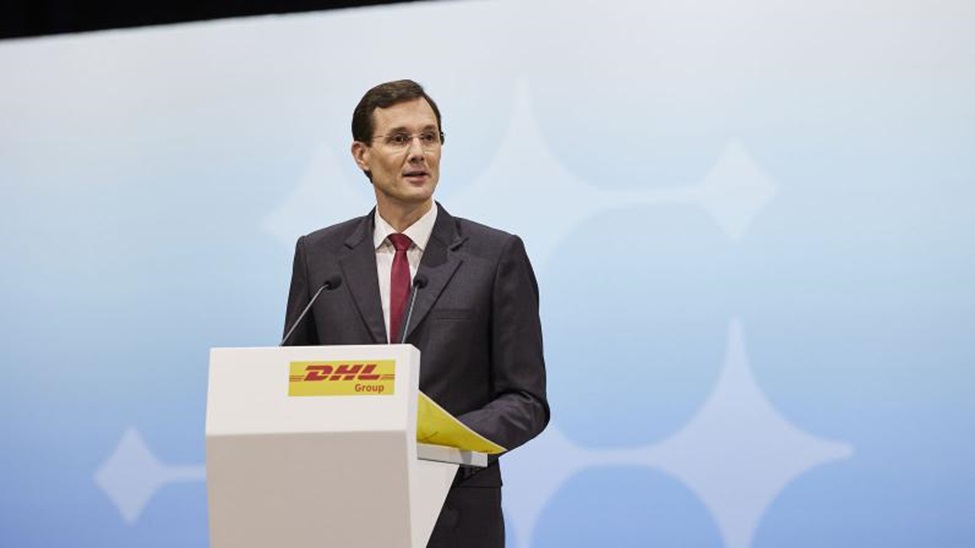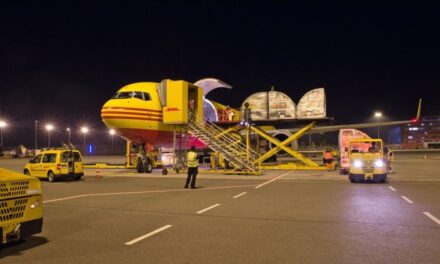
DHL Group CEO: We are in an unusually long period with low momentum in world trade

Logistics group DHL Group has announced Q1 results revealing operating profit is down, weak demand for express and decline in revenue for Freight however E-commerce sales continue to grow.
As expected, there was no significant upturn in the global economy in the first quarter of 2024. Despite these conditions, the Group generated sales of €20.3 billion (Q1 2023: €20.9 billion). At €1.3 billion, the operating result (EBIT) was below the previous year’s level (Q1 2023: €1.6 billion), as anticipated, but exceeded the same period in the pre-pandemic year 2019 (Q1 2019: €1.2 billion).
“We are in an unusually long period with low momentum in world trade. In this environment, we continue to focus on consistent capacity and cost management. But we also see further growth potential. The demand for omnishoring and e-commerce solutions remains high and sustainable logistics is also becoming more and more aware of our customers – we can clearly see this in the demand for GoGreen Plus. With our portfolio, we are ideally positioned to benefit from a revival in global trade. Despite all the challenges, 2024 is a year of opportunity.”
- Tobias Meyer, CEO DHL Group
Measures to safeguard earnings and cash flow are effective
DHL Group had already anticipated the slowdown in global economic momentum in 2022 and successfully initiated appropriate measures to safeguard earnings and cash flow. These measures include, for example, consistent capacity and cost management as well as price adjustments. In the first quarter of 2024, gross capital expenditure (capex) amounted to €483 million (Q1 2023: €569 million).
The Group continued to make targeted investments in the quality of its services and in structural growth trends such as omnishoring, e-commerce, sustainability and digitalization. Free cash flow amounted to €608 million (Q1 2023: €983 million; Q1 2019: -256 million euros).
Overall, DHL Group generated consolidated net income after non-controlling interests of €743 million in the first quarter of 2024 (Q1 2023: €911 million). In the same period, basic earnings per share amounted to EUR 0.63, compared to EUR 0.76 in the first quarter of 2023.
Group confirms forecast for 2024
As expected, there was no broad-based and dynamic economic upturn in the first three months of the year. In the second half of 2024, DHL Group continues to anticipate more positive global economic momentum. Overall, the Group confirms its forecast for the 2024 financial year and expects EBIT of between €6.0 billion and €6.6 billion and free cash flow excluding acquisitions and divestitures of around €3.0 billion.
In its medium-term forecast for 2026, DHL Group continues to expect operating profit of between EUR 7.5 billion and EUR 8.5 billion.
Price adjustments. In the first quarter of 2024, gross capital expenditure (capex) amounted to €483 million (Q1 2023: €569 million).
The Group continued to make targeted investments in the quality of its services and in structural growth trends such as omnishoring, e-commerce, sustainability and digitalization. Free cash flow amounted to €608 million (Q1 2023: €983 million; Q1 2019: -256 million euros).
Overall, DHL Group generated consolidated net income after non-controlling interests of €743 million in the first quarter of 2024 (Q1 2023: €911 million). In the same period, basic earnings per share amounted to EUR 0.63, compared to EUR 0.76 in the first quarter of 2023.
Group confirms forecast for 2024
As expected, there was no broad-based and dynamic economic upturn in the first three months of the year. In the second half of 2024, DHL Group continues to anticipate more positive global economic momentum. Overall, the Group confirms its forecast for the 2024 financial year and expects EBIT of between €6.0 billion and €6.6 billion and free cash flow excluding acquisitions and divestitures of around €3.0 billion.
In its medium-term forecast for 2026, DHL Group continues to expect operating profit of between EUR 7.5 billion and EUR 8.5 billion.
Express: continued focus on revenue and cost management
At Express, demand remained weak, as expected, led to a slight decline in shipment volumes. The division countered the less dynamic market environment with productivity improvements, network optimizations and effective earnings and cost management.
Global Forwarding, Freight: Revenue decline due to lower freight rates
The decline in revenue at Global Forwarding, Freight is mainly due to lower freight rates. The division again recorded growth in air and ocean freight volumes compared to the low level of the previous year. Air freight volumes increased by 5.1 percent, with the improvement mainly due to trade routes between Asia and Europe. Ocean freight volumes increased by 6.6 percent compared to the same quarter of the previous year; in particular, the volume of trade routes from Asia increased.
Supply Chain: stable sales and earnings growth
The Supply Chain Division recorded sales growth in all regions and across various sectors, supported by new business, contract renewals and growing e-commerce business. In the first quarter of 2024, additional contracts with a contract volume of 3.5 billion euros were concluded. In addition to the Energy, Retail and Life Sciences and Healthcare sectors, e-fulfillment made a significant contribution to this. The annualized contract renewal rate remained consistently high.
eCommerce: Sales above previous year’s level
The eCommerce division continued its sales growth. The EBIT development in the first quarter mainly reflects higher costs, also due to continuous investments in the expansion of the networks.
Post & Parcel Germany: Strong parcel business drives revenue and earnings growth
Although there were 1.6 fewer working days in the reporting period, Post & Parcel Germany was able to increase its revenue. This positive development is attributable exclusively to the parcel business. As expected, the postal business continued to decline. Due to the positive development at Paket, the operating result was significantly higher than in the prior-year quarter, which was burdened by additional personnel costs due to the wage dispute. The regulated mail business continued to suffer from the regulatory environment.












